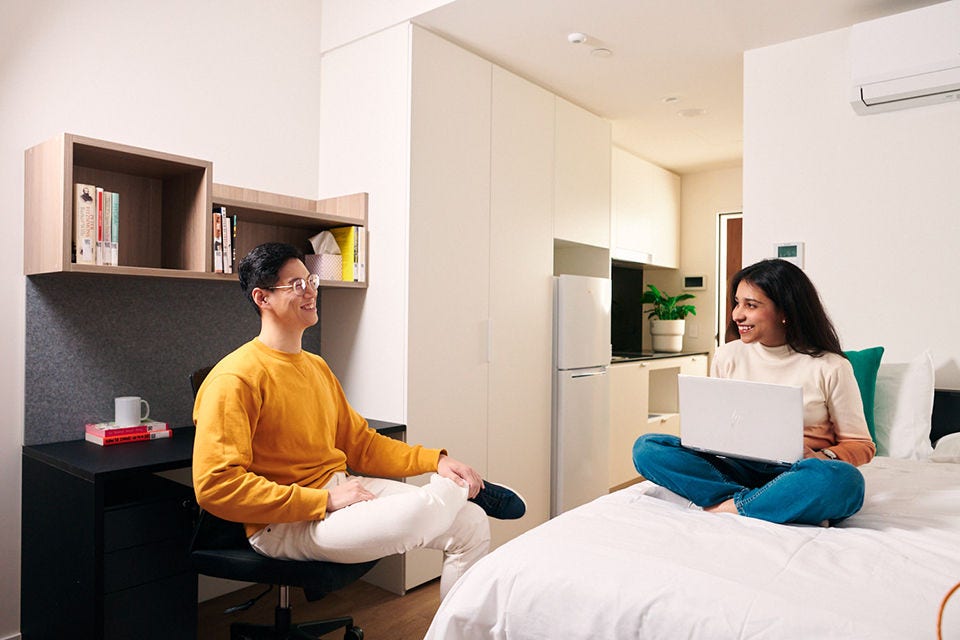
When you arrive in a new country, it can be difficult to find the ideal place to live. You need to be able to find the right type of accommodation for you, at the at the right price.
If you plan to share a house with others, you will also need to find housemates who will be easy to live with... housemates who may even become lifelong friends.
So, we’re here to help you with some advice on finding the right home, and to make sure you know your rights as a housing tenant in Australia.
Renting in Australia
As an international student in Australia, you can rent or ‘lease’ a property by yourself, or with student friends or housemates. You may also choose to live with local Australians so you can also experience a new culture and community at home.
Real estate agents
One option is to apply for rental accommodation managed by a real estate agent who will also manage your rental agreement during your tenancy.
A real estate agent’s office will usually respond promptly to your enquiries and talk to the property owner on your behalf.
Private rentals
You could also apply for accommodation called a private rental, where the owner of the house deals directly with you and manages the property during your tenancy.
It is important to be cautious when looking at private rentals not arranged by registered real estate agents. All property owners must strictly follow regulations on renter conditions and property repairs.
When you are in a private rental arrangement, it may be harder to get quick responses, including when requesting any urgent repairs. So, it’s important to understand your rights and entitlements from the very start of your accommodation search.
Paying a bond
If you rent a house, you will need to pay a security deposit or ‘bond’ (which is usually equivalent to four weeks’ rent). You will also need to pay some rent in advance (usually to cover the first four weeks of your tenancy).
Before you apply for accommodation, carefully check the bond and lease agreements, terms and conditions.
Bond money is held by the relevant state or territory government authority in order to potentially pay for any damages that you, your housemates or house guests may cause to the rental property during your tenancy. Some, or all, of the bond may be refunded to you when your lease ends if there has been no damage done beyond ‘fair wear and tear'.
Important things to note:
- Do not give bond money directly to a housemate as you will not be legally protected if they decide not to return the money.
- If it is a private rental arrangement, make sure that the bond money is given to the residential bond authority in your Australian state or territory and not directly to the owner of the property. Your property manager will give you an official form to fill out in order to provide your bond.
How to find a rental property and housemates
Firstly, you will need to decide if you want to start a new lease on a rental property or move into an existing ‘sharehouse’:
1. Starting a new lease
Signing a new lease can require more paperwork than moving into an existing sharehouse, but you will have more control over your living situation and be able to choose your future housemates from the start.
You can visit real estate agent websites and offices in the local property area to find a listing of available properties to rent.
If you want to get started online, the most common sites to use when searching for rental properties in Australia are realestate.com.au and Domain.
Even when you have found your preferred accommodation, most real estate agents will require you to visit the property in-person before you apply to live there. This is recommended, so that you have an opportunity to check:
- The condition of the property – does it need any urgent repairs?
- Safety features – do the doors and windows lock properly?
- The neighbourhood – do you feel comfortable in the area?
- Location – is it easy to get to your campus, is it close to public transport and shops?
- Surrounding noise levels – will you be able to study in that location?
2. Joining an existing sharehouse
If you are planning to move into a household looking for new housemates (or you want to promote a spare room in your house), websites such as flatmates.com.au and Flatmate Finders can be a useful place to start.
When it comes to finding the right housemates for your home, these are some questions you may want to ask them:
- How often do you normally clean?
- Have you had any difficulty paying rent in the past?
- What do you like to do on the weekends and in the evenings?
- Do you like to cook? Do you have any pets?
- How long are you planning to stay here?
If you’re applying to live in a room in an existing household, they might ask you the same things, so it’s a good idea to think about your answers in advance.
Even when joining an existing sharehouse, make sure that you are on the lease agreement so that you and your financial bond are protected when you leave the house. Do not give your bond money to one of your housemates.
How do I fill out a rental application?
The real estate agent who is advertising and managing the property you’re applying for will tell you what you need to do.
This will include completing an application form. The information you will need to provide may include copies of personal identification, information on your rental history, and some evidence that you will be able to pay your rent, such as an employment contract or pay slips.
The rental market can be competitive, especially in larger cities, so it’s a good idea to keep checking vacancy listings and apply for your preferred accommodation as quickly as possible. It also helps to add a cover letter so you can why you want this particular property and why you are a suitable tenant.
Your rights and obligations
You have the legal right to feel secure at home and live in accommodation that is well maintained and has working water and electricity. But you also need to pay your rent on time and keep the property clean and undamaged.
The real estate agent (property manager) or landlord (property owner) will arrange to inspect the property every 3-6 months. Legally, they must give you at least seven days' notice before entering your home.
Find out more about your rights in our "Accommodation: know your rights" blog post.
There are also a range of international student support services and help available within your state or territory:


